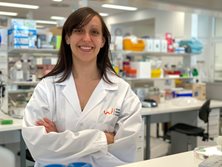October 24, 2023 Print
The Westmead Institute for Medical Research (WIMR) and The University of Sydney are pleased to announce that the winner of the 2023 John and Anne Leece Family Prize is Dr Caitlin Finney.
The John and Anne Leece Family Prize has been made possible by generous philanthropists John Leece AM and Anne Leece and supports the advancement of high achieving PhD candidates or early career researchers at WIMR.
Dr Caitlin Finney is a postdoctoral research fellow in the Neuroinflammatio

n Research Group within WIMR’s Centre for Immunology and Allergy Research. Dr Finney is currently working with Professor David Brown and her research interests include neurodegeneration, Alzheimer’s disease and related dementias, and amyotrophic lateral sclerosis.
Dr Finney was selected as the winner from a diverse field of applicants.
Associate Professor Joanne Reed, Chair of the selection panel for the 2023 John and Anne Leece Family Prize said the panel was impressed by the high standard of submissions.
“There were several very competitive applications. The projects described were all very strong and backed by excellent science, so selecting the top candidate was challenging. On behalf of the selection panel, I congratulate all applicants for the excellent quality of their submissions.
“The selection panel agreed unanimously however that Dr Caitlin Finney’s application stood out as the clear winner, representing the most innovative and original contribution to resolving an important problem related to a specific disease or health condition, in this case, late onset Alzheimer’s disease.
“We were particularly impressed with the fact that, rather than working within an existing group, Dr Finney has brought a brand-new area of research to WIMR and has established her own group independently – a notable achievement at her stage of career, only two and half years post doctorate.
“We all agreed that Dr Finney’s proposed research is novel, innovative and takes an exciting new approach. The degree of support in place from national and international collaborators was a particular strength, as were the pathways to translation. Dr Finney presented a compelling application and clearly articulated how she will use the prize funds to bring about a potentially monumental leap forward in the field. Her research proposal is technically ambitious, but the panel agreed that her outstanding track record to date shows that Dr Finney will be very capable of delivering on her ambitions.
“All agreed that Dr Caitlin Finney’s research offers significant promise that could ultimately lead to more effective treatment options and improved health outcomes, and we congratulate her as the worthy winner of The John and Anne Leece Family Prize 2023.”
Preventing Alzheimer’s disease
With the $20,000 prize money, Dr Finney intends to pursue her research into late onset Alzheimer’s disease. While this is the most common form of Alzheimer’s disease, making up more than 95% of cases, there is currently no real understanding of the genetic causes.
Despite genome wide association studies identifying genetic variants (mutations) that increase the risk of developing Alzheimer’s disease, the functional significance of most of these variants is unknown.
Dr Finney says, “With collaborators, I have recently used machine learning to identify two single nucleotide polymorphisms (SNPs – genetic mutations in DNA) that are highly likely to be functional in late onset Alzheimer’s disease and should urgently be prioritised for study. We have also confirmed in a large cohort of people with Alzheimer’s disease that these SNPs had a three times higher incidence than expected.
“In 2024, the John and Anne Leece prize will allow me to take these findings further and, for the first time, confirm that these SNPs indeed contribute to late onset Alzheimer’s disease pathology.”
In groundbreaking work, Dr Finney is collecting skin samples from people with late onset Alzheimer's disease and turning them into stem cells here at WIMR. The stem cells are then used to produce three of the most common cells in the brain – neurons, astrocytes and microglia.
Dr Finney says, “We combine these three types of cells together to form 3D brain structures. Essentially, they are mini brains in a dish.
“We are looking at how the genetic mutations we have identified affect these mini 3D structures. We expect to see that Alzheimer’s disease will form.”
The potential of this research
This research marks a significant breakthrough that paves the way for personalised interventions for late onset Alzheimer’s disease. Importantly, these genetic mutations will serve as new treatment targets, allowing treatment to be tailored to the individual based on their unique genetic makeup.
Personalised treatments based on genetics have the potential to slow down disease progression, improve quality of life, and provide much-needed hope for a condition that currently lacks effective disease-modifying treatments. This advancement has the potential to shift away from the current treatment paradigm of symptomatic management to targeted therapies that mitigate or even halt disease progression.
Dr Finney says, “I am extremely grateful to John and Anne Leece for their vision and support. This funding will have a significant impact on my research, and hopefully, in the future, it will benefit many people around the world with late onset Alzheimer’s disease. I am thrilled to have been selected.”
The winner of the 2023 John and Anne Leece Family Prize has been selected by an independent panel of assessors comprising:
- Associate Professor Joanne Reed, WIMR’s Centre for Immunology and Allergy Research, Chair of the 2023 John and Anne Leece Family Prize selection committee.
- Professor Carolyn Day, The University of Sydney Associate Dean (Research Education) Faculty of Medicine and Health;
- Professor Andrew Harman, WIMR’s Centre for Virus Research.
Through this prize, John and Anne Leece’s inspiring and invaluable commitment to supporting early-career researchers and PhD students at WIMR is actively enabling the next generation of researchers to develop their expertise and contribute to life-changing medical discoveries that will save lives and provide hope for current and future generations.